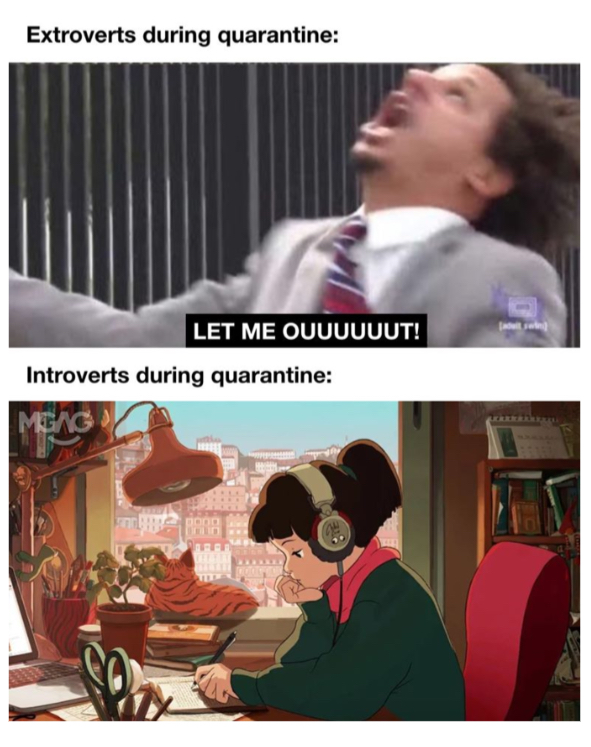This pandemic has drastically changed the way we socialize. In order to stay safe, many responsible students have had to limit the friends they see. Personally, I haven’t seen most of my friends in months. This can leave a big dent in the hearts of extroverts, but do they really have it the worst?
“It was hard at first, since I was so used to seeing so many people. I guess or extroverts, seeing people boosts your ego. Once you stop that routine, then it’s kinda like ‘what’s my purpose now?’ … I think that for introverts, it would be kind of easy, because they’re smart and they don’t really depend on others.”, says Sophomore Carlos Hernandez, an extrovert.

It seems easy to agree with this, because extroverts depend on other people more than introverts. The students we polled on Instagram seem to agree with this as well, considering that 89% of them believe that extroverts have a harder time with this pandemic. Extroverts definitely depend on their friends more for happiness, making it hard to stay positive without face-to-face interaction. I certainly respect this idea, but I think we shouldn’t forget about the unique struggles us introverts go through during this pandemic.
At first, I definitely saw the bright side of stay-at-home orders. There are many times where I feel like I am unwillingly placed into social situations, and COVID acted as a good excuse to get out of them. However, we don’t cut ourselves off from the world. We still speak to people. We still have friends. Without school to force us to see others, our relationships have been damaged far more. I feel a lot more anxious when I need to talk to my friends, and I find it a lot harder to stay connected.
According to a survey of 1,000 American adults held back in April by a Virginia-based research consultant, extroverted people were less likely to experience mental health issues due to quarantine. I understand these results, because extroverts have a larger social circle to depend on for support during these tough times. When introverts experience feelings of anxiety, depression, or stress during this pandemic, it’s harder for them to find the support they need.
Of course, not everyone is a devout introvert or extrovert. Many people fluctuate between the two. An ambivert is a person who has a balance of introvert and extrovert characteristics, and they have truly had to deal with both sides of the story.
“With the days I have more of that drive to reach out to people … it’s just harder to do when you can’t see them across the same campus or see them across your classroom, which has been a problem this year overall, just not being able to see anyone’s face directly is another obstacle … Introverts generally, with the fact that we’re all at home, can help with that … but at the same time, with the people I’ve talked to, it can be seen as more of a hindrance because they don’t have that direct one-on-one time with a teacher, and everyone is kind of having the same problem of not having that motivation…”, says Freshman Vinny Anderson.
Extrovert, introvert, or even ambivert, this pandemic has made social interactions harder, and everyone has had their own unique struggles.
